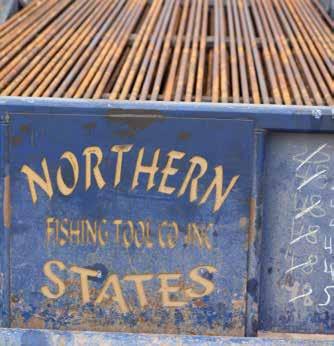
4 minute read
a not-so-wonderful life for the Bakken and north Dakota
REPORT
By Bette Grande
In the movie It’s a Wonderful Life, George Bailly is given the opportunity to see what would happen if he had never been born. While not quite the same, a recent analysis from ICF commissioned by API shows the potential impacts in North Dakota if the Dakota Access Pipeline (DAPL) is shut down. The analysis paints an ugly picture for producers, mineral owners and the state. Even more so given the impact that OPEC and COVID-19 has already had on the Bakken.
The issues surrounding DAPL only compound the significant challenges for operators in the Bakken in 2020. OPEC actions in February pushed oil prices lower, followed by the demand destruction caused by the COVID-19 pandemic, forced producers to idle over 7,000 wells by May 2020, according to the North Dakota Department of Mineral Resources (DMR). Daily oil production in North Dakota dropped from 1.4 million barrels/day in February to under 900,000 barrels in May.
COuRT ACTION
On July 6, 2020, the U.S. District Court in Washington, D.C. ordered DAPL to be shut down and required an additional environmental review of the project. But, by August 6, 2020, the U.S. Court of Appeals for the District of Columbia ruled that the pipeline could remain open for the time being. The legal wrangling continues and DAPL may still be forced to shut down.
The U.S. Army Corps of Engineers (ACE)
When you need extra space, seriously consider…
14073 Highway 2, Williston, ND 58801 701-774-7600 www.designspacemodular.com

866-889-7777
announced the start of its environmental impact statement process on September 10, 2020 and the process is expected to take at least 13 months. ACE is considering whether DAPL should remain in operation while the study is ongoing and a decision on that may come before year-end.
uNCERTAIN FuTuRE
With oil production rebounding from early summer, North Dakota officials believe current production is back above one million barrels/day. If DAPL is shut down, even temporarily, producers will face difficult, and costly, decisions.
The ICF analysis commissioned by API looked at the impacts of a 16-month DAPL shutdown and concluded that the new economics of a post-DAPL world would result in 115 million barrels of Bakken crude left in the ground over the period studied. The analysis determined that the lower drilling activity would lead to 7,400 direct and indirect jobs lost.
Whatever oil that was produced would cost producers an additional $5.88/barrel in transportation costs, significantly lowering the already depressed netbacks. Higher transportation costs will impact Bakken production even if world oil demand picks up based on information from DMR.
In preparation for the 2021 legislative session, officials in North Dakota are developing projections of oil production and pricing for the next biennium.
Projecting the future of oil production, demand and pricing is always a challenge, but today, with uncertainties related to the pandemic and a possible loss of DAPL, budget shortfalls and cutbacks are certain.
According to information from the DMR, North Dakota requires 70 to 80 well completions each month to maintain production of 1.2 million barrels/day. Monthly well completions in from April through September were half of that number. The current inventory of drilled but uncompleted wells (DUCS) in the Bakken has dropped in recent months to 793 and the further completion of these DUCS could help reach that monthly completion target. But North Dakota officials do not expect significant well completions until WTI holds at $45 to $50, and with WTI at around $40 as I write, thus an increase in completions is unlikely.
Drilling activity in the second half of 2020 has focused on leases potentially impacted by any changes to federal permitting process. This seems to have been a smart move given the likely outcome of the election.
It is important to point out that these projections are based on current circumstances. If DAPL is shut down, the discount for Bakken crude would likely widen due to the increased cost of alternative transportation. The ICF analysis showed a net drop in Bakken prices of over $5/barrel, which effectively moves the WTI price target to $50 to $55 before producers will begin to work down the inventory of DUCS.
SERVING THE BAKKEN SINCE 1978 • Fishing Tools • Tool Rental • Plugs and Packers 12 Highly Trained Tool Supervisors

North Dakota, like other oil-producing states, is already facing an uncertain future from economic impacts related to the pandemic and headwinds from Washington, D.C. Add to that the challenge of logistics in the Bakken, the distance from markets, and the shutdown of DAPL could be the proverbial light switch.
The Bakken is not Bedford Falls, but producers and mineral owners are hoping for a Hollywood ending. Stay tuned…
Bette Grande is CEO and president of Roughrider Policy Center, North Dakota’s Think Tank (roughriderpolicy.org). She can be emailed at bette@roughriderpolicy.org. She also represented the 41st district in the North Dakota Legislature from 1996 to 2014. w

Northern States Fishing Tool Co. Inc. 1004 4th St. SW | P.O. Box 346 Watford City, ND 58854









